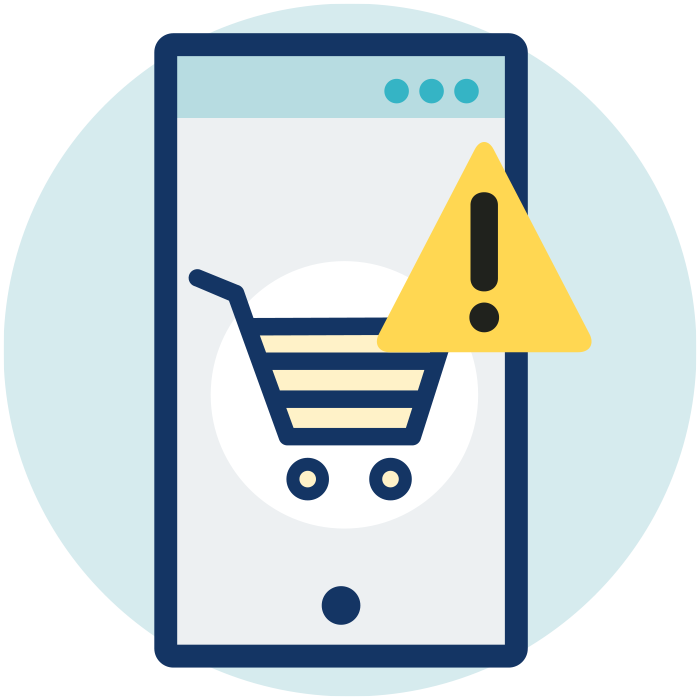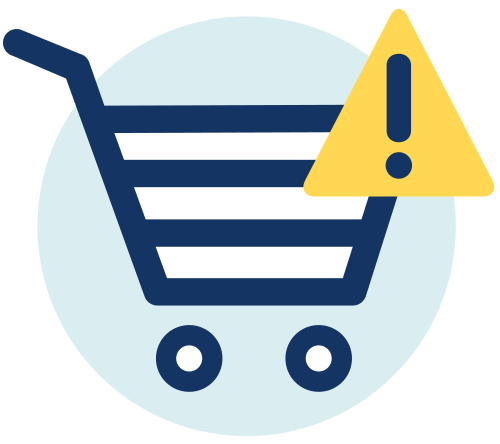

The Office de la protection du consommateur recommends you perform 5 simple checks before making an online purchase. They could prevent you from losing money 😩 or finding yourself in an unpleasant situation 😬.
If you run into a problem after making a purchase, you will surely want to contact the merchant. Might as well check right away if the merchant can be contacted.
Don’t just settle for contacting the merchant on social media. Look for the
If the contact information is indicated, write to the merchant or try the telephone number. Here’s a tip: avoid doing business with any merchant that does not reply or only sends automated messages.
Use the Get information about a merchant tool. Among other things, you can check whether the merchant holds the required permit or licence (in certain cases) or whether the Office has already intervened with that merchant.
Choosing a merchant located in Québec or elsewhere in Canada can end up being very practical should any problems arise after making the purchase… If the item received is defective, or fails to meet your expectations, it may be more difficult to get good after-sale service from a foreign merchant.
In addition, you’ll feel like doing business with a merchant in Québec or elsewhere in Canada if you’re intent on supporting the local economy.
Several Canadian businesses are required to be listed in the registry of the province in which they do business. Canada’s Business Registries lets you find these companies. Those that are listed may be established here. Continue searching the Internet to validate the information.
For items purchased outside the country, delivery service providers sometimes collect customs duties and charge customs clearance fees. If that is the case, the merchant selling you the item must inform you of that possibility. Get all the information to avoid unpleasant surprises.
Did you know there was a way for you to handle customs clearance yourself for your purchases? Find out more from the Canada Border Services Agency.
Dimensions, materials used, weight, quantity, assembly required, etc.: Do you have all the details you need? If you’re purchasing a piece of furniture or an appliance, will it fit through the door or up the stairs?
Merchants are required to give you a detailed description of the goods or services they are offering. Read it carefully, perform all the necessary checks and, if need be, ask the merchant questions.
If necessary, do some online research to make sure you’re not dealing with a dishonest merchant or a fraudulent site. This is a good idea, especially if the offer appears too good to be true. Look for reviews from other consumers in a search engine or with the “magnifying glass” tool on a social media platform. Don’t just rely on reviews posted on the company’s website or comments listed under an ad on social media.
Find out all the information about delivery and the terms and conditions of your purchase. What are the applicable fees and deadlines? Is your purchase a subscription? Are you committing to purchasing products for a determined period?
Also pay attention to the exchange and refund policy. How should you proceed? How much time do you have? Who pays the return fees? Is the original packaging required?
It’s best to read all of this information before making a purchase. This way you can avoid finding out after the fact that your package will arrive too late, or ordering 2 different sweaters in case one doesn’t fit from a company that doesn’t accept returns.
Before goods or services are delivered, that’s prohibited! The merchant should only collect payment by credit card. For example, the merchant cannot ask you for a fund transfer, such as an Interac transfer.
Payment by credit card provides you with protection in the event of any problems, for example, if you don’t receive your package. Under certain conditions, you can cancel your purchase and file a chargeback request to the issuer of the credit card you used to make the purchase. The credit card issuer will then credit your account for the amount paid.
Prepaid cards issued by a financial institution and gift cards do not allow you to file a chargeback request. Use them wisely!
When you make an online purchase, the merchant is required to provide you with certain information before completing the purchase, such as:
Take the time to carefully read the information you are given. The merchant must in fact clearly allow you to accept, correct or reject the offer. If in doubt, it’s always easier to back out now than after the transaction has been completed.
Is the delivery of your washer and dryer taking too long? Was the package containing your new phone stolen? What if the sneakers you received don’t look anything like what you purchased?
Several situations give you the right to cancel your purchase by virtue of the protections provided by the Consumer Protection Act. But act quickly: you must respect the deadlines to exercise your recourse options.
View the procedure to followNeed help? The Office’s agents can answer your questions and provide you with the tools to help you solve a problem with a merchant.
Depending on the situation, you may be able to use Parle consommation, a quick and easy online service to settle a dispute between a consumer and a merchant.
View the Office’s contact informationSome of the information presented on this page does not apply when you purchase certain goods or services online. This would be the case, for example, if you were to purchase food products that spoil quickly.
